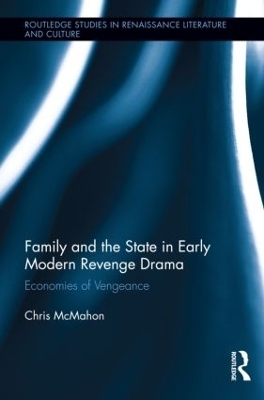
Family and the State in Early Modern Revenge Drama
Economies of Vengeance
Seiten
2011
Routledge (Verlag)
978-0-415-80775-3 (ISBN)
Routledge (Verlag)
978-0-415-80775-3 (ISBN)
This book focuses on early modern revenge plays from the perspective of political theory and anthropology, paying particular attention to the construction, in the plays, of family and state institutions. Plays set for close study are The Spanish Tragedy, Hamlet, The Revenger’s Tragedy, The Malcontent and The Duchess of Malfi.
In this book, McMahon considers Early Modern revenge plays from a political science perspective, paying particular attention to the construction of family and state institutions. Plays set for close study are The Spanish Tragedy, Hamlet, The Revenger’s Tragedy, The Malcontent and The Duchess of Malfi. The plays are read as unique events occupying positions in historical process concerning the privatisation of the family (by means of symbolism and concrete household strategies such as budgeting and surveillance) and the subsequent appropriation of the family and its methods by the state.
The effect is that family becomes an unofficial organ of the state. This process, however, also involves the reform of the state along lines demanded by the private family. McMahon’s critical method, derived from the theory of Bourdieu, Bataille, and Girard, maps capital transactions to reveal emotionally charged, often idiosyncratic responses to issues of shared concern. Such issues include state corruption, the management of women, the performance of roles according to gender, the uses of surveillance, and the ethics of sacrifice.
In this book, McMahon considers Early Modern revenge plays from a political science perspective, paying particular attention to the construction of family and state institutions. Plays set for close study are The Spanish Tragedy, Hamlet, The Revenger’s Tragedy, The Malcontent and The Duchess of Malfi. The plays are read as unique events occupying positions in historical process concerning the privatisation of the family (by means of symbolism and concrete household strategies such as budgeting and surveillance) and the subsequent appropriation of the family and its methods by the state.
The effect is that family becomes an unofficial organ of the state. This process, however, also involves the reform of the state along lines demanded by the private family. McMahon’s critical method, derived from the theory of Bourdieu, Bataille, and Girard, maps capital transactions to reveal emotionally charged, often idiosyncratic responses to issues of shared concern. Such issues include state corruption, the management of women, the performance of roles according to gender, the uses of surveillance, and the ethics of sacrifice.
Chris McMahon holds a PhD in English from the University of Queensland. He is a Tutor in International Studies, University of Canberra, Australia.
1. Introduction 2. Family and judiciary in The Spanish Tragedy 3. Competition and grace in Hamlet 4. Surveillance and consumption in The Revenger's Tragedy 5. Education and autocracy in The Malcontent 6. Meritocratic reform in The Duchess of Malfi 7. Conclusion
| Erscheint lt. Verlag | 31.1.2012 |
|---|---|
| Reihe/Serie | Routledge Studies in Renaissance Literature and Culture |
| Verlagsort | London |
| Sprache | englisch |
| Maße | 152 x 229 mm |
| Gewicht | 640 g |
| Themenwelt | Literatur ► Lyrik / Dramatik ► Dramatik / Theater |
| Geisteswissenschaften ► Sprach- / Literaturwissenschaft ► Anglistik / Amerikanistik | |
| Geisteswissenschaften ► Sprach- / Literaturwissenschaft ► Literaturgeschichte | |
| Geisteswissenschaften ► Sprach- / Literaturwissenschaft ► Literaturwissenschaft | |
| ISBN-10 | 0-415-80775-1 / 0415807751 |
| ISBN-13 | 978-0-415-80775-3 / 9780415807753 |
| Zustand | Neuware |
| Haben Sie eine Frage zum Produkt? |
Mehr entdecken
aus dem Bereich
aus dem Bereich
Der Tragödie erster und zweiter Teil. Urfaust
Buch | Hardcover (2021)
C.H.Beck (Verlag)
CHF 15,90


